Happy 20th anniversary Gilles Duceppe .. it’s not BQ’s fault that rest of Canada still hasn’t got its act together
Aug 16th, 2010 | By Randall White | Category: In Brief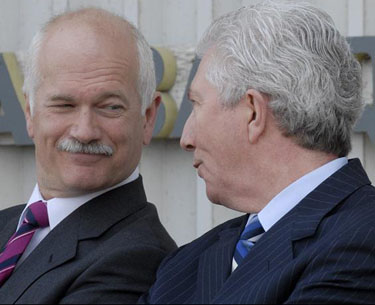
In a recent poll just under 28% of first-choice Bloc Québécois voters picked the New Democratic Party as their second choice.
This past Friday marked the 20th anniversary of Bloc Québécois leader Gilles Duceppe’s August 13, 1990 by-election victory in the eastern downtown Montreal riding of Laurier–Sainte-Marie.
Even with a maternal grandfather from the United Kingdom, M. Duceppe was, so to speak, the first Canadian federal MP to be elected as an ostensibly “sovereigntist” BQ partisan. (The original BQ MPs were Progressive Conservative and Liberal apostates. Duceppe himself was initially elected as an independent: the Bloc was not officially registered as a federal political party until September 11, 1993, not long before the October 25, 1993 federal election.)
Gilles Duceppe subsequently replaced Lucien Bouchard as interim Bloc Québécois leader, for a month or so in early 1996. Then he succeeded Michel Gauthier as full-time leader on March 15, 1997. As Chantal Hébert has pointed out in the Toronto Star: “Today, he is the federal leader with the most seniority and one of only eight MPs to have sat in the House for 20 years or more.”
Ms. Hébert has also aptly urged: “Over his 13 years as leader, Duceppe has put his own social democrat stamp on the Bloc and never more so than since Harper has come to power. Sovereignty is still on the Bloc masthead but since the first Conservative victory in 2006, the BQ’s raison d’être is less emphatically rooted in the constitutional file … in Parliament Duceppe has put much of his heart in a larger battle … After an initial flirt with the Conservative minority government in 2006, he set out to cast the Bloc as a defender of the progressive values he feels Harper is out to trample.”
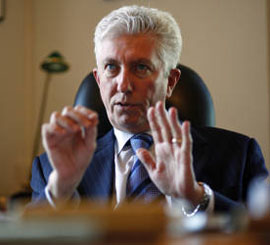
Gilles Duceppe speaks to journalists in his Ottawa office, March 25, 2010. Blair Gable for The Globe and Mail.
There are still those who worry that, even with Gilles Duceppe’s broader social democratic priorities, the Bloc Québécois remains “such a negative force in Canadian politics … As long as Quebecers park their votes with the Bloc, there is little chance any party can win a majority … Quebecers haven’t always played this role. In the Trudeau years, they voted massively for the Liberals. In 1984 and 1988, they strongly supported the Mulroney-led Conservatives … But now, most are sticking with the Bloc. It cannot win, but it can ensure that no other party speaks for all Canadians.”
My own view here is yes and no – and mostly no. Ultimately I don’t think the most serious blame for our current minority government syndrome in Ottawa can be laid at the door of either the Bloc Québécois or the francophone democratic majority in Quebec. In pondering the deepest truth on this issue, the anglophone democratic majority in the rest of the country would be better off looking in the mirror.
* * * *
In the first place, as already noted the BQ itself was created by Progressive Conservative and Liberal apostates, in the wake of the failure of the Meech Lake Accord in late June 1990 (just before Gilles Duceppe’s first election to the federal parliament). If we in the rest of the country really do want to pull the rug out from under the BQ, we have to revive the project of entrenching Quebec’s crucial French fact in our post-colonial Canadian constitution.
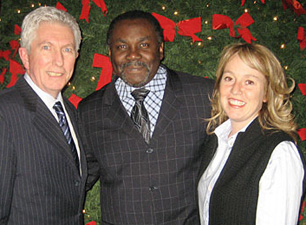
Gilles Duceppe with Bloc MP couple Maka Kotto and Caroline St-Hilaire, at BQ Christmas Party on Parliament Hill, December 2007. Photo: macleans.ca.
Still more importantly, the current minority government syndrome in Ottawa is finally rooted in anglophone Canadian regional conflicts outside Quebec. Cleavages on the conservative side of the ideological spectrum masked these conflicts for a time, and let Pierre Trudeau’s successor Jean Chrétien win three majority governments he did not quite deserve, from the standpoint of the Canada-wide popular vote.
Stephen Harper’s eventual success in uniting the conservative community in anglophone Canada bears the most blame (or praise?) for our current minority government dilemma in Ottawa. And like others I think myself (at the moment at any rate) that our only workable way ahead right now probably lies in some parallel degree of at least co-operation among the diverse Canadian progressive community, in all regions of the country – anglophone and francophone, western and eastern, northern and southern, rural and urban, and inside and outside Quebec.
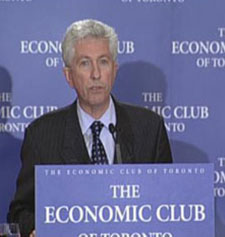
In the fall of 2008 Gilles Duceppe visited Ontario’s capital city, “to urge voters here not to let Stephen Harper get his majority.” He told “about 200 members of the Economic Club of Toronto ... that a vote for the Conservatives at a time of such economic fragility in North America is a vote for financial chaos.”
And to this end I think we in the rest of the country, outside Quebec, should be paying more attention to such hard evidence as the second-choice voting preferences in the latest EKOS poll on Canadian federal politics (as already urged on this website a week or so ago).
In this survey, eg, just over 30% of first-choice BQ voters declared “no second choice.” This is understandably somewhat higher than the 24% of Liberals or almost 27% of New Democrats who claim no second choice. But it is much lower than the more than 46% of first-choice Conservative voters who say they have no second choice. Or, more generally if you like, whatever their truest feelings about “Quebec sovereignty” may be, Bloc Québécois supporters in the year 2010 are at least more willing to co-operate with other (and all so-called “federalist”) political parties than Conservative supporters – and by quite a wide margin.
Meanwhile, among the almost 70% of first-choice BQ voters who are prepared to entertain a second choice, 28% choose the NDP (another sign of M. Duceppe’s “social democrat” tilt), 19% the Green Party, 13% the Liberals, and 10% the Conservatives.
Moreover, as noted on this website a week or so ago: “That almost 70% of Bloc Québécois voters are prepared to entertain second choices among so-called federalist parties also suggests something about the never-ending sovereigntist debate in la belle province today – and about the extent to which leaning on BQ support in the Canadian House of Commons does not logically entail any serious deficiency in Canadian patriotism.”
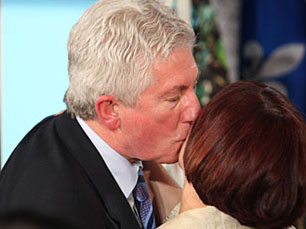
Gilles Duceppe greets his wife, Yolande Brunelle, at the Hyatt Hotel in Montreal, during the 2008 election campaign.
Any party whose supporters show this kind of profile is clearly interested in the future of the Canadian confederation. And it is up to those of us in the rest of the country to show the early 21st century Québécois (aka the first people to call themselves Canadians) that we are ready, able, and willing to guarantee Quebec’s francophone-majority persona, in the post-colonial Canadian confederation whose ultimate practical sovereign power is the anglophone democratic majority of the modern Canadian people (and not the British colonial office across the seas). Maybe once we’ve finally done that, more than a few Bloc Québécois voters actually will start thinking about voting for their second choices among the “federalist” parties in Ottawa.

